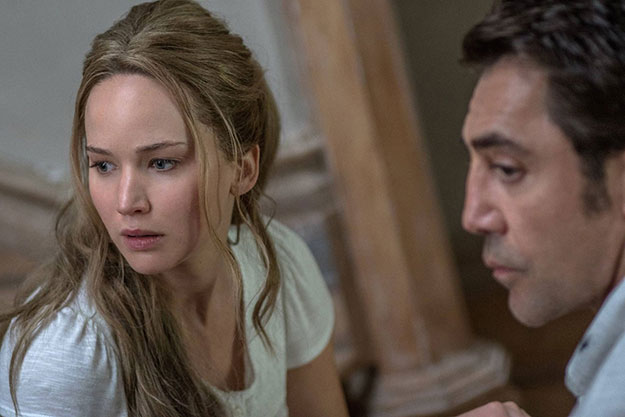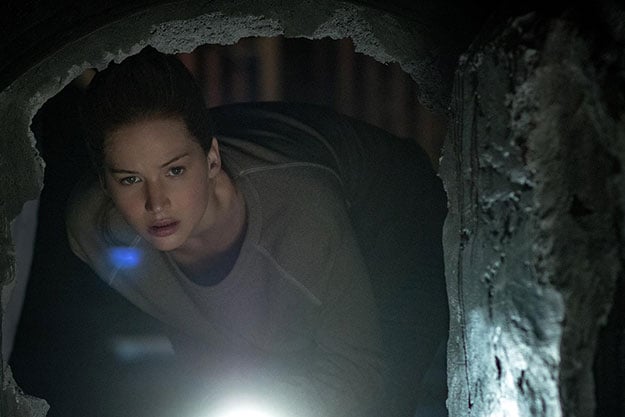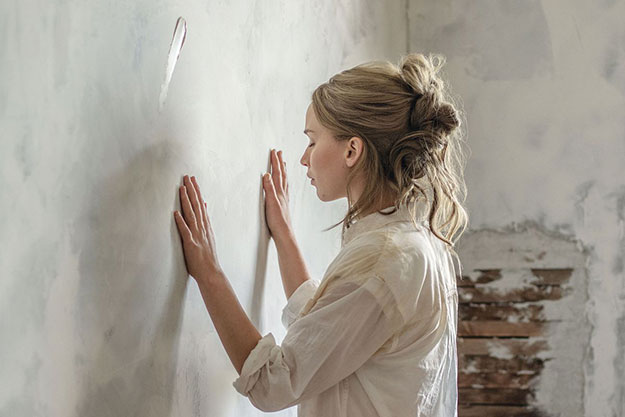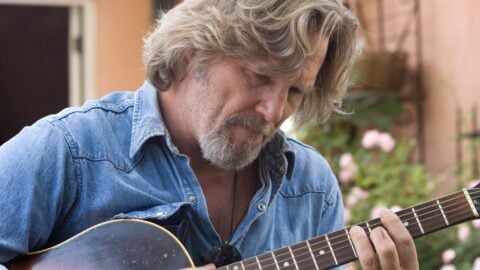Deep Focus: mother!

Darren Aronofsky’s mother! begins as another irritating psychodrama from the director of Black Swan, this time about a selfish poet (Javier Bardem) who mercilessly exploits his wife and muse (Jennifer Lawrence). It ends as another repulsive parable from the director of Noah about humans ravaging Mother Earth. Determined to be powerful and elemental, this movie doesn’t allow the characters to have names or even personalities. They’re Archetypes with a capital A. He’s the artist as ruthless, narcissistic bastard; she’s the wife as forgiving and consoling mate.
A misterioso introduction depicts Bardem as a psychic fixer-upper magically salvaging a burned and ruined house. After the Dr. Strange opening, Bardem mostly just pretends he’s still interested in his wife while he broods about his writer’s block. Meanwhile, Lawrence tries to create a portrait of a woman so resourceful and nurturing that when she whisks a bowl she’s either stirring an omelet or cake mix or blending some egg-based paint for the kitchen walls. She wears the work-pants in the family, but she can’t get any respect. Visitors roll their eyes when they sit on the kitchen counter and she warns them that she hasn’t braced the sink.
With its isolated rural location and atmosphere of domestic fret, mother! comes on like an Ingmar Bergman chamber piece, or the early parts of Straw Dogs. But the first half plays like a parody of psychological drama. Bardem is so inured to Lawrence’s support that when a nameless stranger (Ed Harris) shows up and declares his admiration, Bardem says he’s overjoyed to talk to someone who reveres his work. Aronofsky has shot the movie from Lawrence’s point of view. As an actor she’s so emotionally transparent that, at first, we feel her humiliation viscerally. But the only way to get through this movie is to treat it as black comedy, so she’s sadly the butt of all the jokes.

Soon, Harris’s wife (Michelle Pfeiffer) appears, unannounced, and earns the biggest laughs at Lawrence’s expense. With precision and gusto, Pfeiffer demonstrates what a hyper-sexualized marriage looks like for a real woman. That’s how her part is billed: “woman.” Every time she touches Harris (billed only as “man”), it’s as if she’s doing a PSA about PDA. Pfeiffer does strike some killer attitudes—she’s hilariously entitled when she gives herself the run of the house, skeptical when Lawrence says she and Bardem want to have children, and disparaging when looking at J-Law’s dreary off-white underwear. Unfortunately, Pfeiffer’s pointed satire becomes as wearying as Lawrence’s earnest groping and confusion. Pfeiffer has frequently worked miracles. Collaborating with an actor’s director like Barry Levinson in the scalding HBO film The Wizard of Lies, she locates the potential for redemption in Mrs. Bernie Madoff, a woman who has grown almost terminally complacent. But in mother! she’s laboring for a director who’s under the delusion that he’s a visionary. Aronofsky subjugates his actors to his master plan. If only he were a movie master.
Every “daring” choice he makes stylistically contains a hedged bet. He may eliminate music from his sound track, but he compensates with a stream of aural effects, including creaks and groans from the bowels of the house and thumping heartbeats. He may limit his camera movements to Lawrence’s perspective, but he turns the couple’s rambling manse into a surreal funhouse full of visual ways out. Every “bold’ stroke he attempts substantively merely adds an additional excuse for faux-symbolic weight and histrionic hyperbole.
By the time the two children of “man” and “woman” show up—Brian Gleeson as “younger brother” and Domhnall Gleeson as “Oldest Son”—the action goes south and the allegory ends up East of Eden. Small-scale mayhem ensues (large-scale mayhem follows a bit later). Lawrence grows big with child. (She is credited as “Mother.”) Bardem gets published again. The world’s embrace means more to him than his wife and child. In the second half we witness the worst book launch ever—it devolves into some kind of Armageddon. We discover why Bardem is billed as “Him.” As the center of a primitive new religion, he becomes a bogus spinoff of the Old Testament God who ordered Abraham to sacrifice his child combined with the New Testament God who gave his only son a bloody finish. We realize it isn’t a joke when, earlier in the film, Lawrence says it is time for “the apocalypse.”

The line on Aronofsky is that you never know where his films will take you. Really? In Black Swan, the minute we see that the heroine sleeps in a bedroom fit for an 8-year-old, we just wait for the moment when she jams her stuffed animals down the garbage chute. In mother!, we know that Aronofsky will veer into gory pseudo-mystical directions. The only question is how far he’ll go, not where. Kristin Wiig appears as Bardem’s publisher and publicist rolled into one. (She is billed as his “Herald.”) She brings the film a fleeting glimpse of humorous high style, before waves of pseudo anarchy swallow her and everyone else up.
Aronofsky wants mother! to have the intensity and inner logic of a sweaty nightmare. But it’s a fake cinematic fever dream—the kind made by a director so self-conscious that he’s always checking his own temperature.
Michael Sragow is a contributing editor to Film Comment and writes its Deep Focus column. He is a member of the National Society of Film Critics and the Los Angeles Film Critics Association. He also curates “The Moviegoer” at the Library of America website.







